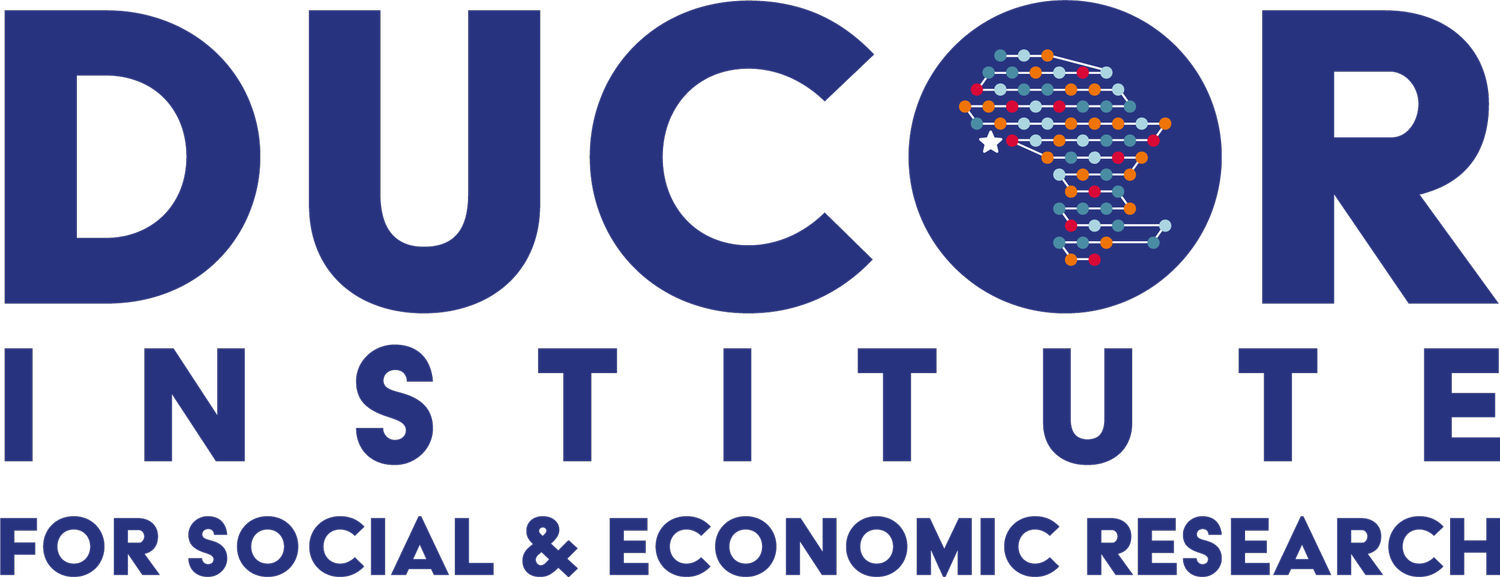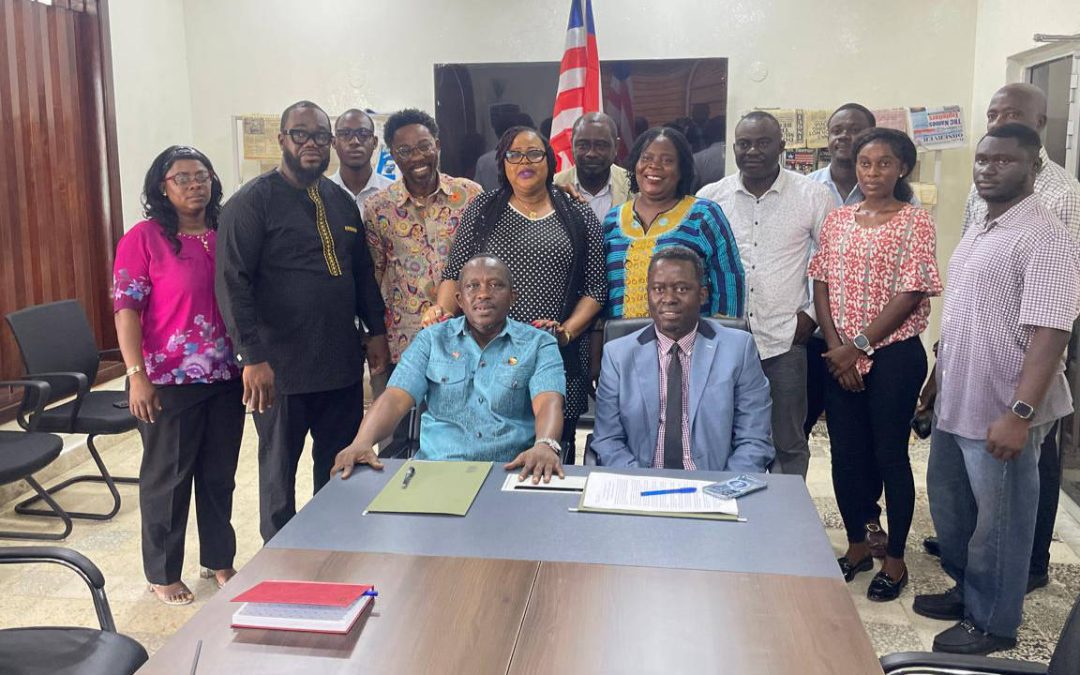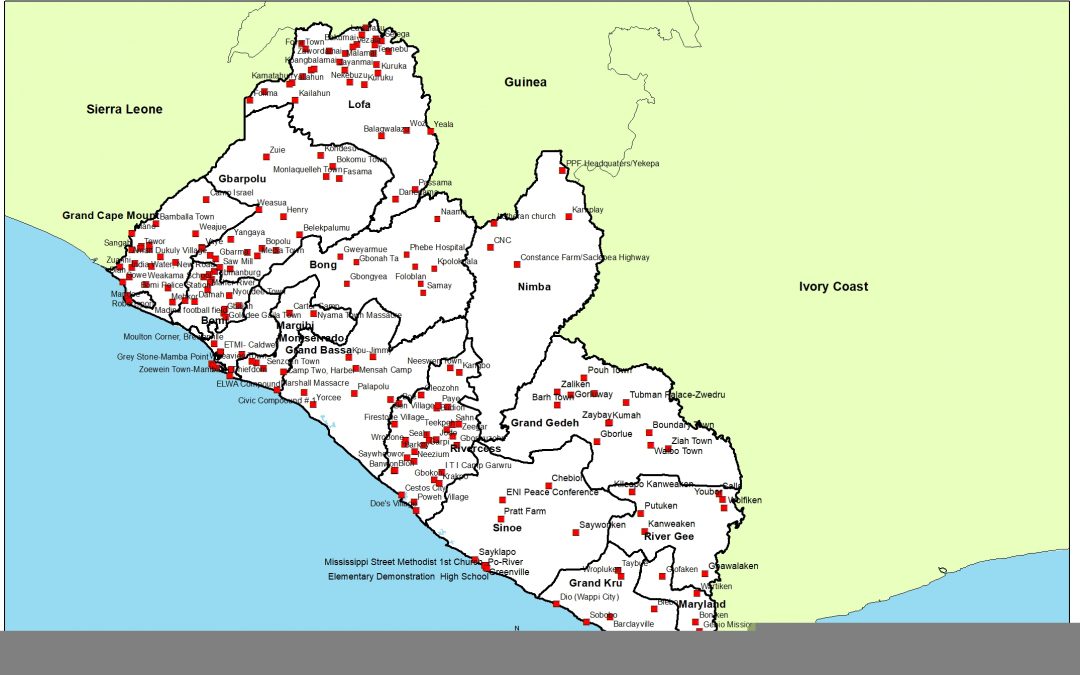By Ali Kaba and Baba Sillah

Introduction
In 2018, the Liberian government passed a progressive Land Rights Law (LRL), which recognizes communities’ customary tenure rights without requiring formal documentation. Experts believe over 70% of Liberia’s territory should be under customary tenure.[1] However, there are concerns about the effectiveness and transparency of the Liberia Land Authority (LLA), the main institution responsible for implementing the LRL. Civil society organizations claim that the LLA prioritizes private and commercial land over customary land. There are also reports of senior government officials acquiring customary land through processes that are not transparent and clearly defined.
At the same time, concessions for mining, plantation, and forestry cover more than 40% of the country’s land, with 10% designated for active or proposed conservation projects. Moreover, the government is actively exploring commercial carbon deals.[2] These land transfers have been met with protests. CSOs and local communities question their legality and fairness. Less discussed, however, is the issue of Tribal Certificates (TCs) on customary land. TCs are semi-recognized documents used by individuals, families, and communities to privatize customary or public land. There is no standard template or chain of custody for TCs; the number in circulation is unknown but believed to be extremely high. This brief explores the complexities of TCs, highlighting their potential negative impacts on communities’ land rights.
What is a Tribal Certificate (TC)?
The Land Rights Law (2018) defines a tribal certificate (TC) as “a legal document issued by a tribal authority under the provisions of the 1956 Public Land law.” This description suggests that individuals holding TCs may have legal claims to the area outlined in the document. However, this definition is a significant departure from TC’s original purpose or meaning.[3] Acquiring a TC was meant to serve as an initial step in a process outlined by the state to validate and issue private deeds to citizens. Under the system, individuals seeking private land in areas used by local communities (but claimed as public land by the state[4]) were required to complete additional technical procedures such as paying fees, obtaining presidential approval, and conducting surveys. While these processes were necessary to validate land ownership, they also created barriers that hindered equal access to remote communities, youth, and women.
Even so, TCs did not confer legal title to the land. They are not standardized or consistently measured, making them a crude tool that theoretically allows any Liberian[5] to privatize “customary” land. TCs can be handwritten or typed, with some bearing the thumbprints of the responsible chiefs and others bearing signatures. Furthermore, chiefs could issue TCs without community consent and often fail to record who has received one, creating multiple claims to the same land. These overlaps are a source of conflict, exacerbating an already complex web of power dynamics that marginalizes vulnerable community members.
Tracking Tribal Certificate
In 2015, the Land Commission (LC), which later became the Liberia Land Authority (LLA) in 2016, embarked on an ambitious project to conduct an inventory of Tribal Certificates (TCs) in select counties. The main objective was to gain a comprehensive understanding of the depth and scope of the TC problem in Liberia. However, the process proved complicated and riddled with technical and political hurdles that rendered the data collected unverifiable.
According to available data from the LC inventory, there are over 1,500 tribal certificates in Bong County, averaging over 250 acres per claim. This number represents at least 15% of the total land area of Bong County, which is just over 877,000 hectares. Furthermore, there is a significant gender disparity in the claims, with only about 150 of the 1,500 claims held by women. While there is no indication of the age of the claimants, it can only be assumed that most of these claims are held by older men or powerful family members. The situation may be even more troubling because the inventory and data collection process was not widely publicized to capture the full extent of claims. Bong County is also home to many private estates, government land, and commercial concessions. Besides Bong, Margibi’s inventory report also shows that: “the average landscape demarcated as per a given Tribal Certificate, ranges between 500 to 1,500, although a sizable amount of the certificates covered areas as huge as 5,000 – 10,000 acres which for all practical reasons, seem inconceivable.”[6]
Although TCs are claimed by a wide range of people and can provide tenure security for some communities and individuals, the extent of private claims on customary land can have a significant impact on land values and social relations. Moreover, the ambiguous history of TCs and the unknown number in circulation raises serious concerns about their presence and legitimacy on customary lands. Against this complex and nuanced backdrop, the central question about TCs is whether the data collected by the Land Commission (LC) is accurate and reliable, and if so, can it be used to extrapolate on other counties in the country? Answering this question will provide a better understanding of the potential impact of TCs on customary land.
The Land Rights Law and Tribal Certificates
The LRL brought significant changes to tribal certificates (TCs), elevating them from procedural documents to legal titles. However, the LRA imposes specific regulations on TCs to ensure their proper handling. One such provision is the distinction between “developed” and “undeveloped” land, with the former protected and the latter subject to renegotiation with the community within a specified time. In addition, Article 47 of the LRL gives individuals or entities holding a validly issued TC two years to comply with the requirements, or the land will revert to the community.[7] The new law also prohibits the issuance of new tribal certificates, effectively phasing them out. Despite this, the LLA has yet to provide guidelines for converting TCs into deeds, raising concerns about the definition of “developed” land, the timeline requirement, and the process for validating TCs. Nevertheless, there are reports that some TCs have already been converted into private deeds.
Key Challenges?
Tribal Certificates (TCs) are deeply rooted in state attempts to reshape rural power, institutions, and material relations. However, due to rural neglect and unclear legal frameworks, customary land tenure practices changed yet persisted alongside legal ones, creating a dual tenure system. The resulting contradictions are a mosaic of overlapping and competing land claims. It has also enabled national and local elites, including chiefs, to alienate customary land, making it difficult to validate these certificates accurately or equitably. In addition, stakeholders have limited information and expertise on TCs. Broadly speaking, there are two main challenges facing TCs:
1) lack of information and competing claims: TCs have existed for several decades. They have been used for social and financial transactions without clear standards or registries and may have changed hands several times, over multiple generations that are difficult to validate. Furthermore, the informal nature of TCs, combined with a general lack of awareness and information about the extent, location, size, and boundaries of land claims, can result in overlaps with a community’s collective or family claims and other private claims or public lands. These overlaps, particularly in cases where power imbalances favor dominant groups or individuals, challenge the fair and equitable validation of competing land claims.
2) Social and Material Differences Between Communities: Land tenure systems vary from one community to another. Some have centralized systems with strong chiefs, while others have decentralized systems with competing elites. Similarly, some communities are densely populated with limited land and resources, while others are sparsely populated. Some communities or individuals may not be interested in validating TCs, while others may be more enthusiastic about the process. The different contexts, competing interests, and power dynamics pose a significant challenge to accurate or equitable outcomes.
Conclusion and Recommendations
Customary land tenure in Liberia remains shrouded in uncertainty. However, in recent years, the government has taken steps (policy and legislative measures[8]) to protect customary land rights. These efforts have come amid growing concerns about large-scale land acquisition or land grabbing. However, a less recognized but equally troubling aspect of this issue is the proliferation of Tribal Certificates (TCs) on customary lands. So, what can we do?
There are two options to consider: 1) to revoke all TCs or 2) to impose strict transfer conditions consistent with customary land practices. While revocation may not be desirable[9], it is important to ensure that any proposed conditionalities or systems for validating TCs into deeds are fair, transparent, and inclusive of local land use practices. For example, technical concepts such as farmland, surveys, conservation, and fencing should not be the sole basis for defining terms such as “developed” or markers of “claims.” Local context and meaning, including secondary access, use, and claim rights, need to be considered. Also, validating TCs at the community level must include diverse viewpoints and interests, prioritizing the perspectives of vulnerable groups such as women and youth. Inclusive and transparent decision-making at both local and national levels minimizes the influence of vested interests on outcomes. Ultimately, whatever approach is adopted should aim to reduce inequalities and conflicts by recognizing long-established private and communally held interests in land (for specific policy recommendations, see below).
Policy Recommendations
- Establish a fair, transparent, inclusive process and a grievance mechanism for converting TCs into title deeds. This mechanism must be easily accessible to civil society and community members, who must clearly understand the procedures involved and the rights and entitlements of vulnerable groups.
- Engage in inclusive consultations. Inclusive decision-making allows community members to share their knowledge about land use, claims, and boundaries. It ensures that individual and communal land rights are recognized and respected.
- Maintain comprehensive record systems or databases of TCs and associated land claims and boundaries, ensuring they are properly recorded and indexed for easy access and retrieval. This system must also include a process to vet the legality of existing tribal certificates.
- Provide legal or technical support and guidance to marginalized communities and groups, ensuring land administrators, TC holders, and local leaders comply with relevant laws and regulations.
- Conduct awareness campaigns to educate community members about the importance and implications of converting TCs into title deeds. Awareness messages should be clear and targeted, stressing inclusive decision-making and the rights associated with customary land (family plots and communal claims).
Notes
[1] Rights and Resources Initiative (2020). Estimate of the area of land and territories of Indigenous Peoples, local communities, and Afro-descendants where their rights have not been recognized. @ https://rightsandresources.org/wp-content/uploads/2020/09/Area-Study-Final-1.pdf
[2] Ashoka Mukpo. Massive carbon offset deal with Dubai-based firm draws fire in Liberia. (Mongabay, 4 August 2023) https://news.mongabay.com/2023/08/massive-carbon-offset-deal-with-dubai-basedfirm-draws-fire-in-liberia/. Accessed November 2023
[3] While the land tenure system in Liberia is diverse and includes both statutory and customary rights, the only legal document that grants and transfers title to land is the ‘Title Deed’, not the ‘Tribal Certificate.”
[4] While the definition of public land is controversial in some circles, the general practice has been that any land not officially recognized or titled by the government is considered public land.
[5] However, it is often those with the power and resources that do so.
[6] Based on the Land Commission’s Tribal Certificates Inventory Processing Project Final Report (March – June 2013).
[7] In theory, this timeline should begin in October 2018. However, the LLA’s legal opinion suggests start date depends on the LLA’s clock.
[8] Laws such as the National Forestry Reform Law (2006), the Community Rights Law (2009), and the Land Rights Law (2018) protect the rights of communities to manage their land and forest resources.
[9] In a 2018 Landportal discussion on Liberia’s proposed Land Rights Act, most respondents, with a few exceptions, concede to converting tribal certificates to deeds. However, they stressed the need for transparency and fairness in their issuance. See @ https://landportal.org/debates/2018/liberia-land-rights-act.





0 Comments